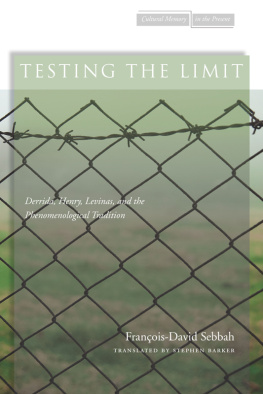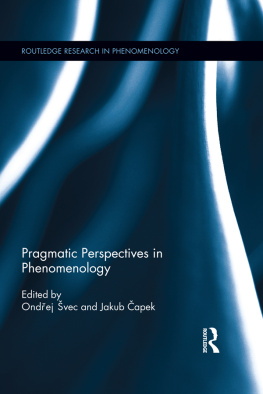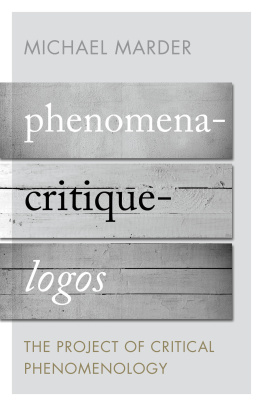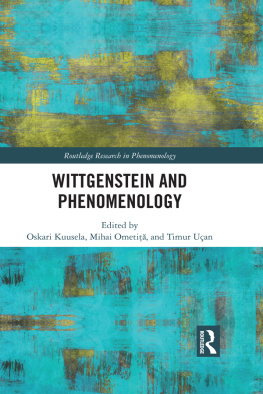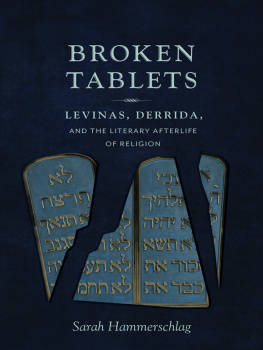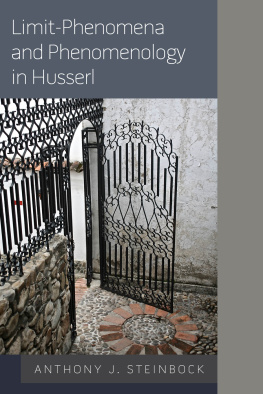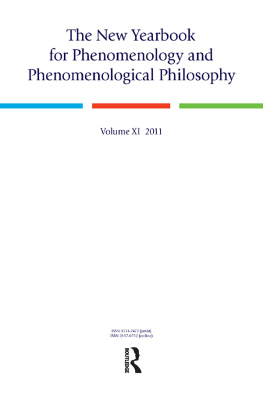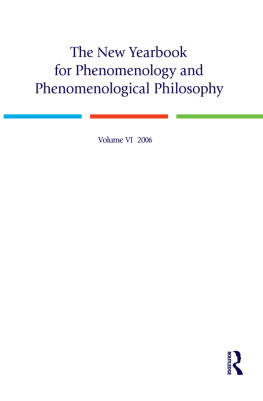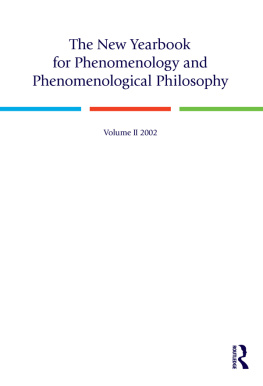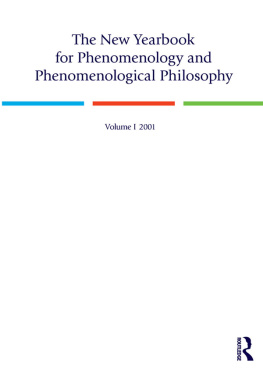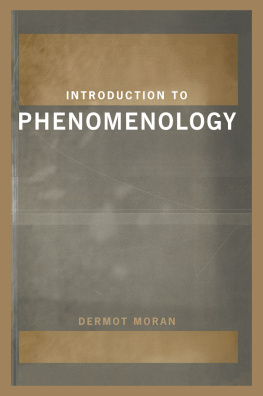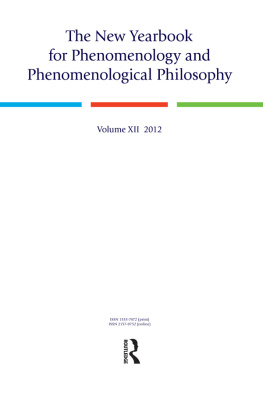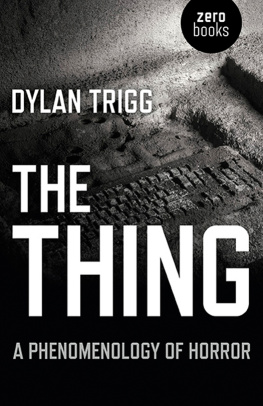C ultural Memory in the Present
Mieke Bal and Hent de Vries, Editors
Stanford University Press
Stanford, California
English translation 2012 by the Board of Trustees of the Leland Stanford Junior University. All rights reserved.
Testing the Limit was originally published in French under the title Lpreuve de la limite: Derrida, Henry, Levinas et la phnomnologie Presses Universitaires de France, 2001.
This book was published with the assistance of the Edgar M. Kahn Memorial Fund and the University of Technology of Compigne (UTC).
Cet ouvrage a bnfici du soutien des Programmes daide la publication de lInstitut franais / ministre franais des affaires trangres et europennes. / This work was provided support by the Publication Assistance Program of the Institut Franais / French Ministry of Foreign and European Affairs.
No part of this book may be reproduced or transmitted in any form or by any means, electronic or mechanical, including photocopying and recording, or in any information storage or retrieval system without the prior written permission of Stanford University Press.
Printed in the United States of America on acid-free, archival-quality paper
Library of Congress Cataloging-in-Publication Data
Sebbah, Franois-David, author.
[preuve de la limite. English]
Testing the limit : Derrida, Henry, Levinas, and the phenomenological tradition / Franois-David Sebbah ; translated by Stephen Barker.
pages cm. (Cultural memory in the present)
Originally published in French under the title Lpreuve de la limite.
Includes bibliographical references.
ISBN 978-0-8047-7274-7 (cloth : alk. paper)
ISBN 978-0-8047-7275-4 (pbk : alk. paper)
ISBN 978-0-8047-8200-5 (e-book)
1. Phenomenology. 2. Philosophy, French20th century. 3. Derrida, Jacques. 4. Henry, Michel, 19222002. 5. Levinas, Emmanuel. 6. Intentionality (Philosophy) 7. Subjectivity. I. Title. II. Series: Cultural memory in the present.
142'.7dc23
2011032773
TESTING THE LIMIT
Derrida, Henry, Levinas, and the Phenomenological Tradition
Franois-David Sebbah
Translated by Stephen Barker
STANFORD UNIVERSITY PRESS
STANFORD, CALIFORNIA
Contents
Acknowledgments
This book is the result of many years of research. I want especially to thank Jacques Colette for having made me the beneficiary of his expertise along the way. I offer deep thanks as well to Franoise Dastur not only for the generous attention she gave to these pages, but also for the ceaseless encouragement she showed me over long years. In addition to Jacques Colette and Franoise Dastur, Rudolph Bernet, Jean-Toussaint Desanti, and Jean-Michel Salanskis gave invaluable advice; I thank them for their commentary, of which this text, I hope, carries many traces.
I want to express my profound gratitude to Jacques Derrida, Jean-Toussaint Desanti, and Michel Henry, who read certain passages addressing their work and who always encouraged me to proceed in my own direction.
Thanks as well to Alain Cugno, Anne Montavont, Jacob Rogozinski, and Franois Roussel, who offered editorial assistance in the final stages. Special thanks to Mireille Sguy, who assisted in the books development.
Warm thanks as well to Elisabeth Lemirre for her manuscript editing.
The solitary work of reading texts must be perpetually stimulated, at least for me, by discussion; I want therefore to thank all those involved in the various spaces for philosophic discussion in which I worked for seven years. I think particularly of the fruitful exchanges I was able to have at the revue Alter, in the TSH Department at the University of Compigne, and at the International College of Philosophy, which published the original French version of this book in one of its series.
Introduction
This work originated, or at least received its impetus, in my encounter with certain texts of Emmanuel Levinas, Michel Henry, and Jacques Derrida.
The encounter was traumatic, so my pleasure in reading philosophy is now never free of a certain imposed discomfort. I had numerous startling surprises. First, it seemed that these texts were, at least in significant part, literary textswhich certainly does not mean that this accounts for their essence or that they should therefore be denied the status of philosophical textsor, on the other hand, that we should argue in favor of a confusion between the philosophic and the literary. It simply means, in the first place, that the philosophical necessity for the unveiling of what is, as it is, is not in these texts separable from the work of languagelanguage considered as something that must be workedor from any specific style.
Additionally (and this is an indication of their traumatic power), one of the significant stylistic traits shared by these texts is violence, a violence done to the logos itself in its apophantic exigency as manifested, for example, in its persistent practice of paradox, metaphor, oxymoron, and parataxis. And the reader is the first to be exposed to this violence, if reading a text entails re-creating for oneself the acts of thought it suggests.
These works clearly produce meaning, but do they not also dangerously deviate from the standards of evidence and the transparency of language characterizing the Husserlian idea of phenomenology as, precisely, a rigorous science? These are necessary questions, since they relate to phenomenology, and in each case this relationship concerns its very essence. My attempt here will be to demonstrate that the opposite is also true: that phenomenology is concerned, in its very essence, with its relationship to itself and to these questions. It must be understood, howeverand this is vitally importantthat none of the texts examined here is inscribed exactly on the axis of the phenomenology preceding them: all claim in one way or another to exceed it.
In any case, if it is true that for Adjukiewicz philosophy belongs to the evolution of logical positivism, and Husserlian Wesensschau was already an example of metaphoric usage and was simply suggestive of language in its conflict with direct, literal, univocal expression (a conflict necessary to the explicit argumentation required for a true scientific philosophy), then we can easily glimpse the kind of judgment to which we could submit Levinass, Henrys, and Derridas works on the basis of such criteria.
I am certainly not holding to these criteria: to do so would simply render the specific readings of the authors I am interested in here impossible. The fact remains, however, that they do put to the crudest of tests any requirement of clarity and explicit argumentation that apparently needs to be maintained in order for philosophy to be philosophy. Yet an essential aspect of this requirement is the courage to venture into regions in which it tests the limit of its own power: the texts we will examine will bring us to this limitone of the essential aspects of their traumatic nature.
The issue of this limit can be made clearer if we concentrate on the related question of the practice of phenomenological method. In fact, it seems that these texts stylistic violence can be more precisely described as the fact of an excessive style. This in turn means that inseparable from any writing style a mode of phenomenological description is also brought into question.
But do these authors not, paradoxically enough, test out the idea that adhering to radicality can be pushed too far? That the discourse of radicality can be inverted into merely excessive discourse doing violence to the constraints of its own proper coherence and pertinence? Thus, it is in fact the fundamental operation of the phenomenological reduction itself that is in play: the phenomenological reduction as renewal [

